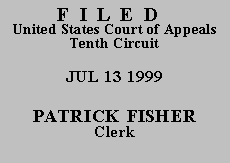

| DUJUAN TANZELL REED,
Petitioner-Appellant, |
|
| v. | |
| GARY L. GIBSON, Warden,
Respondent-Appellee. |
|
DuJuan Reed, an Oklahoma state prisoner appearing pro se, seeks a certificate of appealability to appeal the district court's denial of his 28 U.S.C. § 2254 habeas petition. We deny his motion for a certificate of appealability and dismiss the appeal.
Reed was convicted in state court of two counts of lewd molestation of a child under the age of sixteen, after former conviction of a felony, and was sentenced on September 17, 1996, to twenty years' imprisonment. He did not perfect a timely direct appeal from his conviction and sentence. On December 12, 1996, he filed an application for post-conviction relief with the trial court, effectively seeking to file an appeal out of time. The application was denied on December 18, 1996. After attempting, without success, to file an amended application for post-conviction relief with the trial court, he appealed the denial of his post-conviction application to the Oklahoma Court of Criminal Appeals, which affirmed the denial on February 28, 1997. Nearly one year later, on February 17, 1998, Reed filed his federal habeas action. Pursuant to respondent's motion to dismiss, the district court dismissed the habeas petition on statute of limitations grounds. The district court denied a certificate of appealability.
On April 24, 1996, Congress amended what had been "the long-standing prior practice in habeas corpus litigation that gave a [state] prisoner virtually unlimited amounts of time to file a habeas petition in federal court," and "established a one-year period of limitations for [federal] habeas petitions." Hoggro v. Boone, 150 F.3d 1223, 1225 (10th Cir. 1998) (citing 28 U.S.C. § 2244(d)(1)). By statute, the one-year period of limitations generally begins running from "the date on which the judgment became final by the conclusion of direct review or the expiration of the time for seeking such review." 28 U.S.C. § 2244(d)(1)(A). The one-year period of limitations can be tolled by ongoing post-conviction litigation in state court. See Hoggro, 150 F.3d at 1226. In particular, 28 U.S.C. § 2244(d)(2) provides "[t]he time during which a properly filed application for State post-conviction or other collateral review with respect to the pertinent judgment or claim is pending shall not be counted toward" the one-year period of limitation. We have also indicated the one-year period of limitations "may be subject to equitable tolling." Miller v. Marr, 141 F.3d 976, 978 (10th Cir.), cert. denied, 119 S. Ct. 210 (1998).
In his appeal, Reed effectively invokes both tolling principles in an attempt to persuade us his federal habeas petition was timely filed. Not only does he ask us to toll the time during which his state post-conviction proceedings were pending (December 12, 1996, to February 28, 1997), he also asks us to toll the time from the date his conviction and sentence became final (approximately September 27, 1996) until the date on which he filed his application for state post-conviction relief. In support of this latter request, Reed contends his trial counsel failed to perfect a timely appeal and Reed allegedly did not learn of this failure until shortly before he filed his application for post-conviction relief.
Although we are bound by statute to toll the time during which Reed's state post-conviction proceedings were pending, we refuse to equitably toll any other time. In Miller, we indicated that equitable tolling principles apply only where a prisoner has diligently pursued his federal habeas claims. 141 F.3d at 978; see also Davis v. Johnson, 158 F.3d 806, 811 (5th Cir. 1998) (AEDPA's one-year limitation period will be equitably tolled only "in rare and exceptional circumstances"), cert. denied, 119 S. Ct. 1474 (1999); Miller v. New Jersey State Dept. of Corrections, 145 F.3d 616, 618-19 (3d Cir. 1998) (equitable tolling applies only where prisoner has diligently pursued claims, but has in some "extraordinary way" been prevented from asserting his rights). Here, the record fails to demonstrate that Reed diligently pursued his federal habeas claims. In particular, the record fails to justify the long delay from February 28, 1997 (date denial of post-conviction application affirmed on appeal) to February 17, 1998 (date federal habeas petition filed). We therefore refuse to apply equitable tolling principles under these circumstances, Miller, 141 F.3d at 978, and conclude Reed's federal habeas petition was filed out of time.
Because Reed has not "made a substantial showing of the denial of a constitutional right," 28 U.S.C. § 2253(c)(2), his request for a certificate of appealability is DENIED and the appeal is DISMISSED. The mandate shall issue forthwith.
Entered for the Court
Mary Beck Briscoe
Circuit Judge
*.This order and judgment is not binding precedent, except under the doctrines of law of the case, res judicata, and collateral estoppel. The court generally disfavors the citation of orders and judgments; nevertheless, an order and judgment may be cited under the terms and conditions of 10th Cir. R. 36.3.